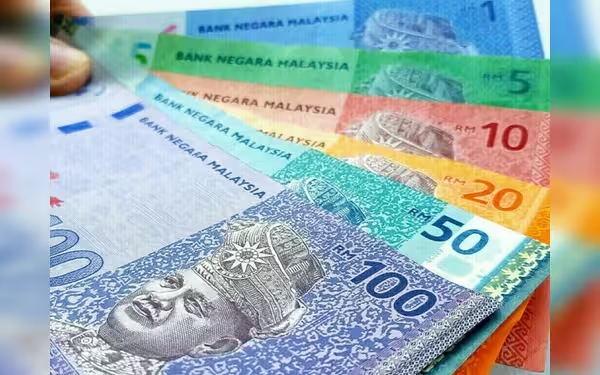Saturday, October 5, 2024 10:32 PM
Malaysian Ringgit Surges as Chinese Stocks Rally
- Malaysian ringgit reaches highest value in three years.
- Chinese stocks soar nearly 6% amid new stimulus measures.
- Investors optimistic about economic recovery in Asia.
 Image Credits: brecorder
Image Credits: brecorderThe Malaysian ringgit surges against the US dollar, while Chinese stocks rally, reflecting positive market sentiment and economic recovery in Asia.
The financial landscape in Asia has recently witnessed significant shifts, particularly with the Malaysian ringgit making headlines. On Monday, the ringgit surged against the US dollar, reaching its highest value in over three years. This remarkable rise can be attributed to new stimulus measures introduced by China over the weekend, which have positively influenced market sentiment across the region. As a result, the ringgit climbed by as much as 0.6%, making it the top performer among emerging Asian currencies, trading at 4.099 per US dollar.
China plays a crucial role in the economic dynamics of Asia, being the largest trading partner for many countries in the region. The Malaysian currency's impressive performance this quarter, with an increase of approximately 12.6%, has positioned it as the best-performing currency among its peers. Several factors have contributed to this success, including strong foreign investor inflows, steady economic growth, and a stable political environment.
Christopher Wong, a currency strategist at OCBC, expressed optimism regarding the Malaysian ringgit's future, stating, "We remain constructive on MYR’s outlook as solid fundamentals continue to hold up - robust economic growth, current account surplus, fiscal improvement, and sustained foreign inflows." This sentiment reflects a broader confidence in the Malaysian economy, which is benefiting from favorable conditions.
In addition to the ringgit's rise, Chinese stocks experienced a significant boost, soaring nearly 6%. Investors are hopeful that the new measures will help alleviate the ongoing economic downturn faced by China, the world's second-largest economy. However, it is important to note that China's markets will be closed for a week-long holiday starting Tuesday, which may impact trading activities.
As part of its efforts to support the struggling property market, China's central bank announced plans to instruct banks to lower mortgage rates for existing home loans before October 31. This move is expected to provide much-needed relief to homeowners and stimulate economic activity. The new stimulus measures have also helped to counterbalance concerns regarding China's slowing manufacturing activity in September.
Other Asian currencies, such as the Thai baht, Taiwan dollar, and South Korean won, also saw gains, rising between 0.2% and 0.4%. Meanwhile, the Singapore dollar and the Philippine peso remained stable. Investors are now looking ahead to inflation reports from South Korea, Indonesia, and the Philippines, as well as a crucial US jobs report that could influence the Federal Reserve's monetary policy decisions.
Analysts from Barclays have noted that while Indonesia and the Philippines have already begun their rate-cutting cycles, countries like Malaysia, Singapore, and Thailand are unlikely to ease their policies until at least 2025. They stated, "A relatively more positive growth outlook if China does enjoy a significant rebound could, at the margin, reduce the need for monetary policy easing for some central banks." This perspective suggests that the economic recovery in China could have ripple effects throughout the region.
In contrast, the stock markets in Taipei, Tokyo, Seoul, Manila, and Jakarta faced declines, with Taipei stocks falling by as much as 1.7%. The semiconductor giant TSMC experienced a 2.5% drop, while the Nikkei in Tokyo slumped about 4.5%. Investors are closely monitoring the situation as they await policy directions from Japan's incoming Prime Minister Shigeru Ishiba, who has previously criticized the central bank's policies.
The recent developments in the Malaysian ringgit and Chinese stocks highlight the interconnectedness of Asian economies. As countries navigate through these changes, it is essential for investors and policymakers to remain vigilant and adaptable. The ongoing economic recovery in China could serve as a catalyst for growth in the region, but challenges remain. Understanding these dynamics will be crucial for anyone looking to make informed decisions in the ever-evolving financial landscape.













